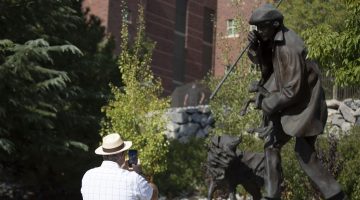The Reynolds School of Journalism hosted the second annual First Amendment Forum on Wednesday, April 25, in the Joe Crowley Student Union. Lucy Dalglish, dean of journalism at the University of Maryland, and Trevor Timm, co-founder and executive director of the Freedom of the Press Foundation, joined Professor Patrick File to discuss issues related to law, student media and the First Amendment.
The theme of the discussion was “Can They Do That?” and focused on the suppression of journalists, and the limits on the First Amendment. Dalglish and Timm each discussed the issues they feel are most pressing regarding the First Amendment.
Dalglish spoke about the history of objectivity in the press — something she said never existed. It has evolved through the perspectives of the people writing it. She said newspapers were started by political parties to spread their ideology, and from there, newspapers began to be thought of as public property for information to be shared.
Fact-based journalism began to replace sensationalism when the invention of the telegraph put a price on the number of words used. The Associated Press was founded at this time, and The New York Times began the notion of a non-biased report. It wasn’t until after the Civil War that newspapers began investigative journalism.
Radio and television disrupted the journalism industry by introducing faster reporting, which became the norm, and protections for journalists came through court rulings — the most notable being New York Times v. Sullivan, where the Supreme Court set a high standard for libel. Dalglish said America has a solid body of law and protection for journalists that came through the 70s and 80s and continue a tradition of protection.
“Being a journalist these days in the United States is a fairly safe occupation,” Dalglish said. “Journalism is still a very dangerous occupation in many parts of the world.”
Dalglish said the internet brought further disruption to the journalism industry and business model to the point where a solution still hasn’t been found, but she felt confident that students entering the workforce will figure it out.
Timm took an opposite approach and discussed journalism in the Trump era. He said Trump threatened to sue news organizations, discredited them by calling them “fake news” and disparaged them in daily tweets.
Trump campaigned on wanting to loosen federal libel laws, which don’t exist — libel protections came through court decisions and precedent.
“Trump would probably be the first person to go bankrupt because of this libel law given that he decides to spout off every single enemy that he’s ever made on Twitter on a daily basis,” Timm said.
A considerable issue raised when Trump was elected was how he could use his power to suppress journalism. Timm said the precedent was set by the Obama administration, which prosecuted leaks more than the Trump administration has by subpoenaing journalists for years on end for their sources.
Timm said it’s too early to tell what legacy Trump will leave on the freedom of the press, but the tools were left to him by Obama. Timm urged the audience to visit the U.S. Press Freedom Tracker created by the FPF, which categorizes prosecution of journalists from around the country. He said this tool will be able to decipher trends of media violence. He hopes it will make authorities “think twice” about arresting a journalist doing their job.
Timm said these incidents are underreported because journalists don’t like to make themselves the story or lawyers ask them not to discuss it because of an ongoing case.
After Dalglish and Timm’s presentations, File facilitated a discussion among the experts. He started with a question about the amount of public trust in the media.
Timm said “the media” is a vague term that is hard to define, and it could be considered cable news, newspapers, social media and more individually or lumped together. He said Trump has signaled to his base not to trust news organizations, and it has backfired on him because the press has become aggressive against him.
Dalglish said there isn’t trust in national news organizations because of partisanship, but increasing trust in local news and people the public knows in a community. She also said students on college campuses don’t want to talk about the First Amendment, which she deemed “frightening”.
File asked if there was a current court case that is bringing the spotlight back to old issues.
Timm said the public is seeing the Trump administration as another Nixon administration and is bringing back issues brought up by NYT v. U.S., or the Pentagon Papers case, which limits prior restraint of publications by the government. This is reminiscent of the fire and fury publication and Stormy Daniels scandal.
“I wouldn’t be surprised in the next two and a half years if we see a case like that,” Timm said.
Dalglish said limits of prior restraint is an American concept, and media in other countries do not have that same right, and she fears someone will be able to convince the American court system to revert the precedent that was set by decades’ worth of legal decisions.
File finished the discussion period with a question about the role of student media in university communities. The day of the forum was also a nationwide day of action to bring attention to issues of funding and independence student newsrooms face.
Timm said student newspapers are platforms for journalists to start their careers and practice what they are being taught. He believes they are important so students can learn their rights as journalists before entering the workforce.
Dalglish said she was surprised by administrative complaints she receives as a Dean regarding what student journalists write for the independent publication at her university. She said their concerns can be teaching moments for student journalists, but educators don’t help fix the mistakes.
“People really, really do worry about student journalism. It’s kind of reassuring in a way,” Dalglish said.
The event was sponsored by UNR alum Warren Lerude, KNPR and the RSJ.
Madeline Purdue can be reached at mpurdue@sagebrush.unr.edu and on Twitter @madelinepurdue.











